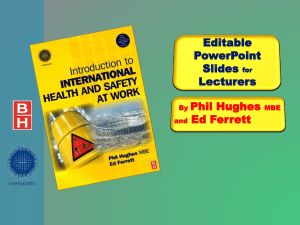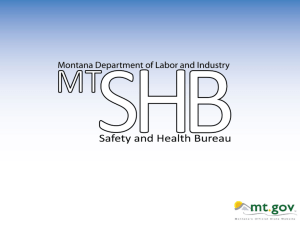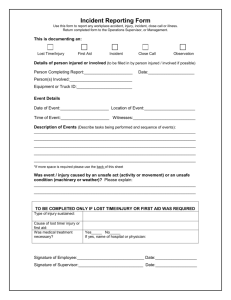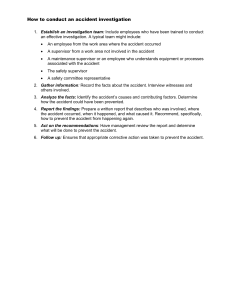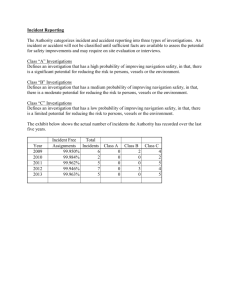BLR's Safety Training Presentations
advertisement
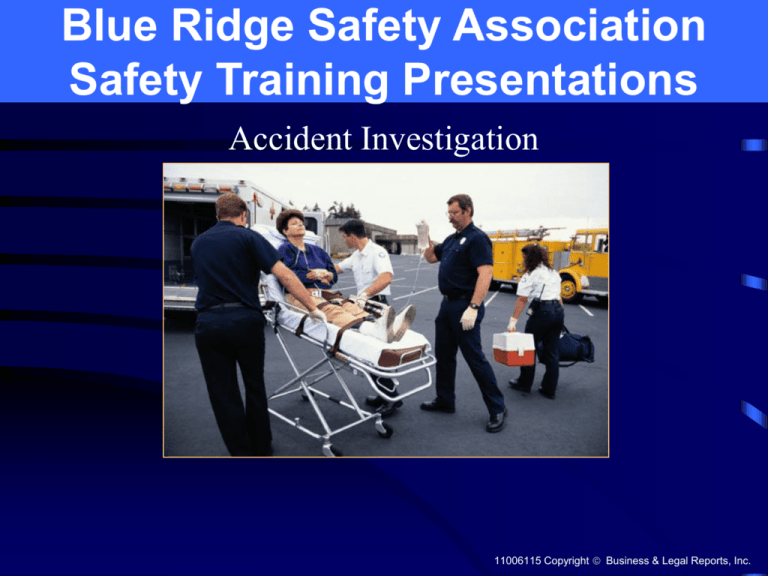
Blue Ridge Safety Association Safety Training Presentations Accident Investigation 11006115 Copyright Business & Legal Reports, Inc. Accident Investigation Goals Preparing the investigation team Conducting the investigation Quiz 11006115 Copyright Business & Legal Reports, Inc. Why Investigate Accidents? Prevent a recurrence with corrective action Determine the cause Document your company’s version of the incident Complete OSHA-required reporting 11006115 Copyright Business & Legal Reports, Inc. Who Investigates? Minor accident —Supervisor —Safety committee member Major accident —Supervisor —Safety committee member —Safety manager —Production manager 11006115 Copyright Business & Legal Reports, Inc. Investigator’s Qualifications Accident investigation training Understanding the importance of investigation Ability to communicate details 11006115 Copyright Business & Legal Reports, Inc. When to Investigate? Immediately after incident —Witness memories fade —Equipment and clues are moved Finish investigation quickly 11006115 Copyright Business & Legal Reports, Inc. Investigation Kit Camera and film Report forms, clipboard, pens Barricade tape Flashlight Tape measure Tape recorder Work gloves 11006115 Copyright Business & Legal Reports, Inc. Accident Investigation Goals Preparing the investigation team Conducting the investigation Quiz 11006115 Copyright Business & Legal Reports, Inc. The Accident Occurs Employee immediately reports the accident to a supervisor Supervisor treats the injury or assesses need for outside medical treatment Leave the accident scene intact Contact the accident investigation team 11006115 Copyright Business & Legal Reports, Inc. Beginning the Investigation Gather investigation team and kit Report to the scene Look at the big picture Record initial observations Take pictures 11006115 Copyright Business & Legal Reports, Inc. What’s Involved? Who was injured? Medication, drugs, or alcohol? Was employee ill? Double shift or rotating shifts? 11006115 Copyright Business & Legal Reports, Inc. Witnesses Who witnessed the incident? Was a supervisor or lead person nearby? Where were other employees? Why didn’t anyone witness the incident? 11006115 Copyright Business & Legal Reports, Inc. Interviewing Tips Discuss what happened leading up to and after the accident Encourage witnesses to describe the accident in their own words Don’t be defensive or judgmental Use open-ended questions 11006115 Copyright Business & Legal Reports, Inc. What Was Involved? Machine, tool, or equipment Chemicals Environmental conditions Production schedule 11006115 Copyright Business & Legal Reports, Inc. Time of Incident Date and time? Normal shift? Employee coming off a vacation? 11006115 Copyright Business & Legal Reports, Inc. Incident Location Work area On, under, in, near Off-site address Doing normal job duties 11006115 Copyright Business & Legal Reports, Inc. Incident Activities Motion conducted at time of incident Repetitive motions? Type of material being handled 11006115 Copyright Business & Legal Reports, Inc. Incident Description Details so reader can clearly picture the incident Specific body parts affected Specific motions of injured employee just before, during, and after incident 11006115 Copyright Business & Legal Reports, Inc. Causal Factors Try not to accept single cause theory Identify underlying causes Primary cause Secondary causes 11006115 Copyright Business & Legal Reports, Inc. Corrective Actions Immediate corrective actions Recommended corrective actions —Employee training —Preventive maintenance activities —Better job procedures —Hazard recognition 11006115 Copyright Business & Legal Reports, Inc. Completed Report Signed by investigation members Signed by injured employee Forwarded to claims management 11006115 Copyright Business & Legal Reports, Inc. Accident Investigation Goals Preparing the investigation team Conducting the investigation Quiz 11006115 Copyright Business & Legal Reports, Inc. Summary Investigate accidents immediately Determine who was involved and who witnessed it Ascertain what items or equipment were involved Record detailed description Determine causal factors Conduct corrective actions 11006115 Copyright Business & Legal Reports, Inc. Quiz 1. It is best to interview witnesses all together in order to save time. True or False 2. Name two environmental factors that may be involved in an accident: ______________ and ______________. 3. Define a “minor” accident according to investigation procedures: __________________________________. 4. The main reason for investigating accidents is to fix the blame somewhere. True or False 5. Employees need to report injuries only if they think they need to see a doctor. True or False 11006115 Copyright Business & Legal Reports, Inc. Quiz (cont.) 6. Prior to arriving at the accident scene, one team member should have taken the __________________. 7. Describe at least two factors to investigate about the injured employee: ______________ and _____________. 8. How could the time of the accident be considered a causal factor? 9. Describing the general accident location is adequate for the report. True or False 10.Describe at least two factors to investigate when equipment is involved: ____________ and ___________. 11006115 Copyright Business & Legal Reports, Inc. Quiz Answers 1. False. Witnesses should be interviewed separately. 2. Wet floor, poor lighting, cold or hot day, noise. 3. A “minor” accident is when the injured employee does not require outside medical attention. 4. False. Accidents are investigated so corrective actions can be taken to prevent another accident. 5. False. Employees need to report all injuries, no matter how small, and near-miss incidents. 11006115 Copyright Business & Legal Reports, Inc. Quiz Answers (cont.) 6. Investigation kit. 7. Alcohol or drugs, medication, illness, tired, extra shift, eyesight. 8. Early morning accident related to tired, inattentive employee. Late afternoon accident related to fatigue of a full day of work. 9. False. The report requires very specific details of the location of an accident. 10. Equipment malfunction, employee training and skill level, amount of supervision. 11006115 Copyright Business & Legal Reports, Inc. Blue Ridge Safety Association Thank you for supporting BRSA We appreciate your comments about the effectiveness of this training method and the delivery system E-mail your comments to comments@blueridgesafety.org 11006115 Copyright Business & Legal Reports, Inc.
